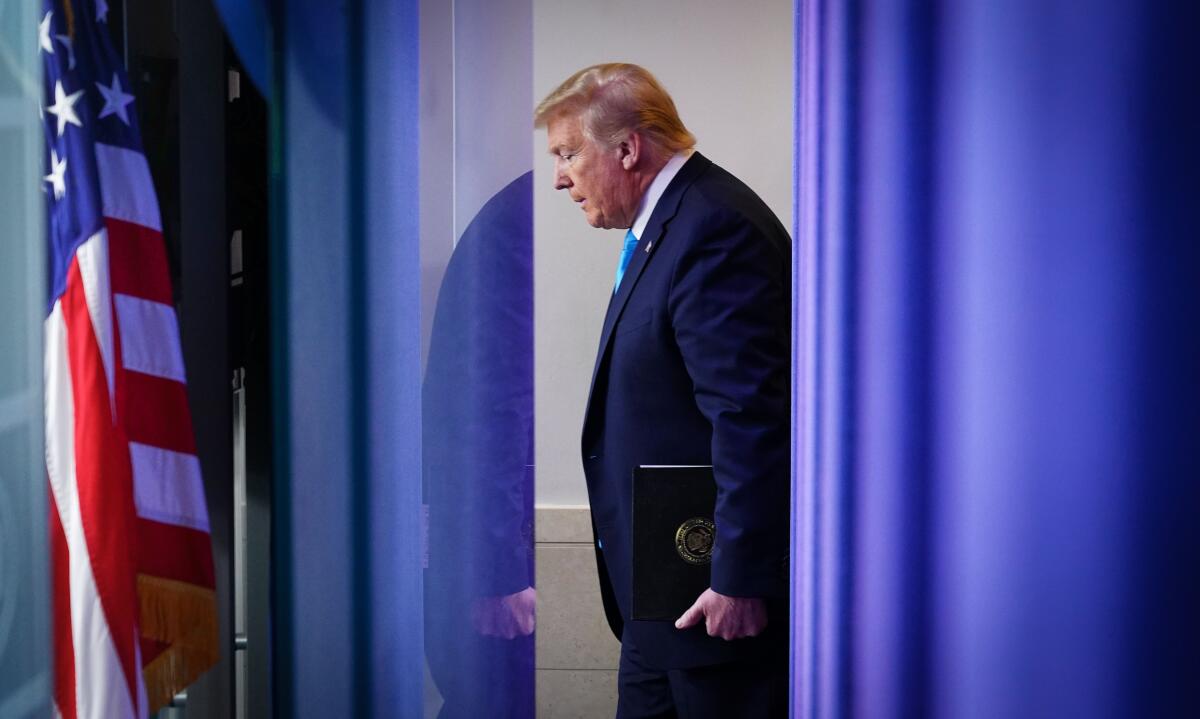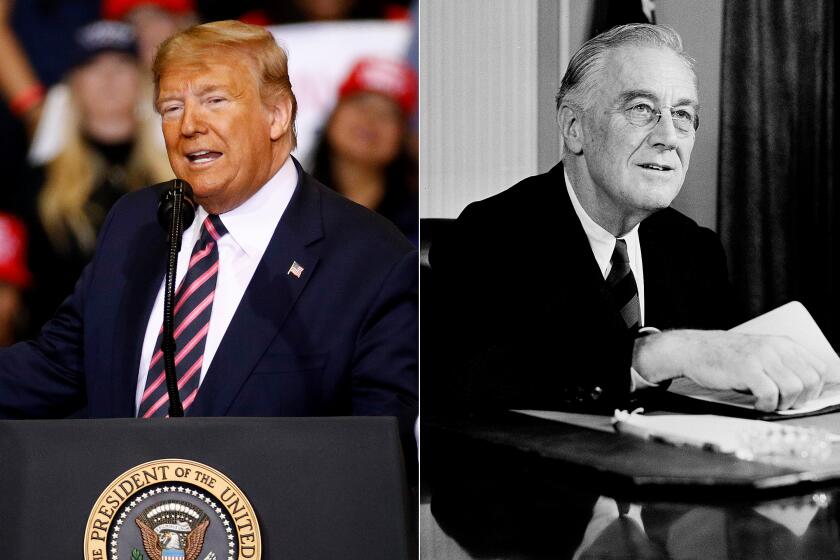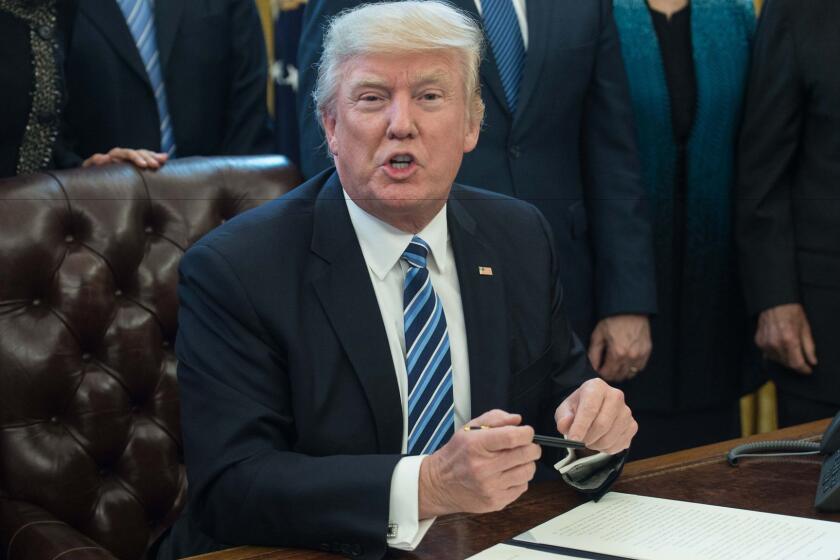Trump hasn’t got the chops to acquire the authority he claims. Thank God

- Share via
President Trump’s proclamation Monday that he alone has “total authority” over the states during the coronavirus crisis was quickly rejected by a chorus of legal scholars of all political stripes, as well it should be. The president’s off-the-cuff claim was not only silly but antithetical to core constitutional principles. It also demonstrated why Trump won’t succeed at chipping away at limits on executive power — something other presidents have done in times of national crisis.
Perhaps we should be thankful: Trump simply hasn’t got the leadership chops to acquire the outsize authority he insists is his by sheer right of office.
Ours is a federal government of enumerated — that is to say, specified and limited — powers. The Constitution’s Article II, which establishes the executive branch, contains no residual grab bag of authority for Trump to pull out and use in case of emergency. The shelter-in-place orders or social distancing rules that now apply to much of the county are classic instances of “police power,” which under the Constitution’s Article I unambiguously belongs to the states. Trump can’t be top cop, nor can he boss other (state) cops around.
None of that will change, even if, as Trump suggested Monday, Atty. Gen. William Barr’s Department of Justice “write[s] up papers” to attempt to bolster the president’s “total authority.” (Whatever the lawyers at the DOJ might produce, it won’t go further than detailing the emergency powers Congress has handed over to the president in earlier crises.)
As much as the Constitution disallows Trumpian totalitarianism, in the last 80 years, presidents have aggrandized their powers in times of crisis by wresting away parts of Congress’ interstate commerce authority. That’s a political process involving delegation of the federal authority from Congress to the executive branch, and it has happened at such a clip that it is a point of concern for some who see in it congressional cravenness and abdication of responsibility.
Comparing the coronavirus crisis and the surprise attack in Hawaii in 1941 only points up the gulf between the divisive Donald Trump and the unifying Franklin D. Roosevelt.
With bravado, charisma and an appeal to the public that bold action was crucial, President Franklin Roosevelt was able to wrest huge power from Congress in response to the Depression and Pearl Harbor. President George W. Bush rode his impromptu post- 9/11 bullhorn speech (“I can hear you. And the people who knocked these buildings down will hear all of you soon”) to waves of political support for enhanced emergency powers for intrusive law enforcement measures that Congress readily ceded.
In all, the Brennan Center for Justice at New York University Law School has documented 136 statutes passed by Congress that presidents can leverage for emergency powers in a crisis.
The reasons for each increase in White House authority are complex and fact-specific. One element, however, has always been present: effective crisis leadership. Presidents whose emergency powers increased harnessed or built on these basic qualities: credibility, rhetorical skill, political appeal and, most importantly, consensus-building.
Trump’s management of the pandemic, indeed, his entire presidency, has none of those benchmarks. His high-handed style of governing leaves him without the political wherewithal of other presidents. He has blundered and blustered his way through the coronavirus crisis, subverting consensus at every turn.
Trump cedes power to the states when it suits him, and claims it for the federal government when it suits.
Beginning with his prolonged and inexcusable trivialization of the threat (notwithstanding, we now know, having received clear information of the virus’ imminence and gravity), Trump has been often wrong but never in doubt. He has politicized the crisis, basing life-and-death decisions primarily on their impact on his reelection prospects. He has demeaned science, the media and governors of both parties. He has repeatedly lied about his own past words and decisions. He has, in other words, been Trump.
Were almost any other person in the White House during this crisis, he or she might be seeking enhanced authority from Congress and might be able to secure it — politically, legislatively. And it might be to the ultimate good of the country. But this president insists that his “total authority” simply be acknowledged, his ring kissed, and he has gotten nowhere with governors of both parties who have pushed back — or simply ignored — his obnoxious claim that they must accede to his power.
A few real leaders have risen to fill the vacuum — Fauci, Cuomo, Newsom, Pelosi. Their relatively good judgment, steadiness, political sophistication and rationality have served to diminish the effects of the virus and provide some confidence to the public. What they say carries weight. Trump’s late start and erratic follow-through only works with those already in his thrall, and some of them are deserting him now.
The president so far has done more harm than good. He has diminished, not aggrandized his office. His best service to the country at this point would be to stay out of the way so others can lead.
More to Read
A cure for the common opinion
Get thought-provoking perspectives with our weekly newsletter.
You may occasionally receive promotional content from the Los Angeles Times.











